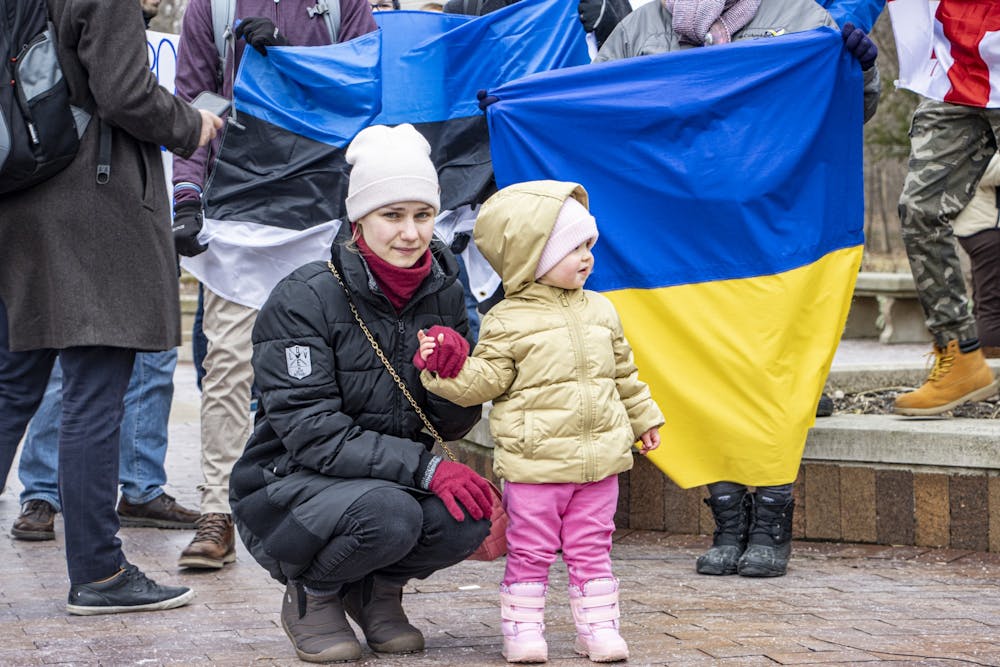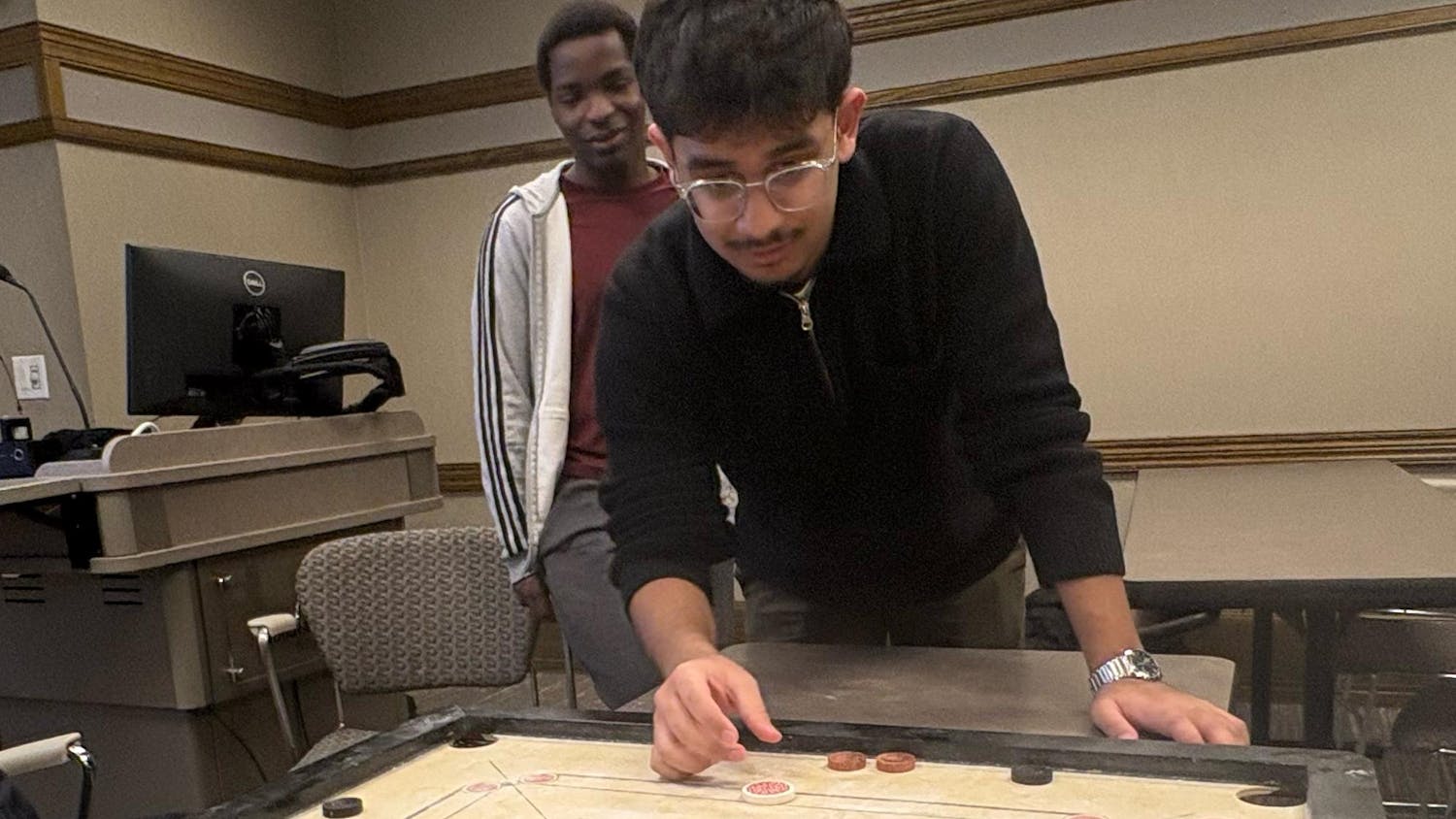Dmitry Romashov, IU lecturer and Russian citizen, said he felt grief when Russia first attacked Ukraine. He said it’s important the world and Russian leaders hear the voice of Russian citizens like him who are against the war. He doesn’t know what else he can do.
“I’m not a hero,” he said. “I’m not a rebel.”
Romashov grew up in Moscow, and while many of his friends and family live in Russia, he has friends in Ukraine too. It’s easy to imagine the situation reversed as Ukraine is so close to Russia culturally, he said.
“Russia has a long history of terror against its own people,” he said. “It is not impossible, in my opinion, that the times of yet another round of terror have come.”
Many people in the Russian community at IU do not agree with its government’s actions.
A lot of citizens in Russia lack a clear understanding of the war due to the massive spread of misinformation and independent media getting blocked, Romashov said. Many people are tired of the aggressive and toxic content they receive, he said.
Related: [Russian forces capture first major Ukrainian city of Kherson]
Romashov said although he’s heard others encourage Russians in the country to protest their leaders’ actions, people are scared.
“I’m very thankful that I’m not there right now,” he said. “I don't know how I would act.”
Any Russian citizen who expresses a form of disagreement about the war or supports Ukraine humanitarian efforts is considered a traitor in their country, Romashov said. Russia’s parliament passed a law March 4 sentencing those who spread what Russian leadership perceives as false information about the military to up to 15 years of jail time, according to Reuters.
“People feel bound,” he said. “They feel helpless. They feel that they cannot protest because they have their families, children, jobs.”
Romashov said many Russians are facing a moral dilemma about how to support the Ukrainian people without wishing pain or defeat on Russian soldiers.
“The only right way to de-escalate this conflict would be to stop the war, and Russia should stop the war,” he said.
Romashov fears Russian leadership may become desperate which would lead to further escalation. He said Russia’s current demands, which include the Ukrainian army surrendering and the annexation of Crimea, are unacceptable. Pacifying a tyrant would set a bad precedent, he said.
“This conflict is very toxic and it’s very dangerous,” he said. “Not only for Ukraine, not only for Russia, not only for Europe, but for all of us.”
Romashov has not been back to Russia since he left in 2015.
“The main reason why I didn’t want to go back was fear,” he said. “My worst concerns and my worst fears are coming true right now.”
***
Andrey Yushkov, IU Ph.D. student and Russian citizen, said his family, both inside and outside of Russia, are united against the war in Ukraine.
“We all know that innocent people live there and they suffer dramatically,” he said.
Yushkov is fearful of Russian leader Vladimir Putin’s threats of a nuclear war. He said he hopes Russian officials prevent Putin from taking such action. Yushkov said he thinks the negotiation process is the only way to de-escalate the conflict. However, every Ukrainian is prepared to fight, he said.
Related: [‘A crime against humanity’: IU Ukrainian community shares fears surrounding Russian attack]
Sanctions could also play a role in de-escalation as Russia is one of the biggest exporters of oil and gas to Western countries, Yushkov said.
Several of Yushkov’s friends, among other young, educated citizens, are leaving Russia because they disagree with the war.
“They cannot tolerate it,” he said. “They don’t want to be associated with this regime, with Putin’s regime.”
***
Tatiana Saburova, IU lecturer and Russian citizen, said she first felt shame when she heard about the war. As a Russian historian and citizen, she said she felt a responsibility to prevent the war.
A global war can be easily started by one conflict, Saburova said. She said NATO and the U.S. administration are careful with their involvement because they don’t want to start a nuclear war.
“If you have a nuclear war, that’s probably the last war on the planet,” she said.
Saburova said she admires the Ukrainian people’s bravery in defending their country. Many Russian people support Ukraine and are demanding the end of the war, she said.
“It’s important to understand that we don’t have mass protests in Russia now, not because the Russian people support this war, but because it’s really hard to make any mass protest, any anti-war movement in Russia right now, because it’s really suppressed,” she said.
Saburova’s daughter lives with her in the United States. Her parents in Russia are having a more difficult time understanding the war because for most of their lives Ukraine was a part of the Soviet Union. Her daughter speaks with them daily and offers them sources to help understand the war, Saburova said.
Saburova said her main concern is stopping the war and the suffering of the Ukrainian people who are hurt, dying and fleeing their homes.
“It’s a human tragedy in Ukraine,” she said. “We definitely stand with Ukraine, not with Russia at this war, because it’s impossible in any way to defend this war, or to justify this war. It’s unprovoked."




